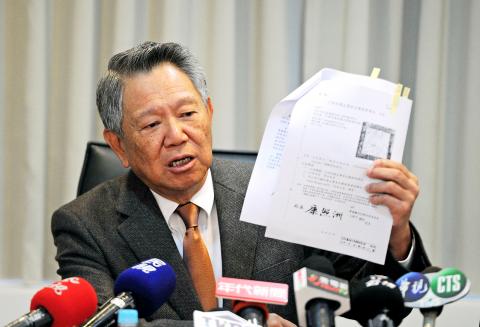The National Health Research Institutes (NHRI), a nonprofit foundation established by the government, yesterday said it could produce 200,000 doses of a vaccine against the new H7N9 strain of avian flu within three months in the event of an emergency.
“The NHRI could support Department of Health policies to fight disease by producing vaccines if there were an emergency,” Su Ih-jen (蘇益仁), director of the NHRI’s National Institute of Infectious Diseases and Vaccinology, said at a meeting called by the Taiwan Solidarity Union (TSU) at which the department gave a briefing on H7N9 bird flu vaccines.
The health department reported it has sent out requests to the US Centers for Disease Control and Prevention (CDC), the WHO and China for the vaccine strain or the virus strain, and have so far secured the US CDC’s preliminary consent to access its H7N9 virus strain.

Photo: CNA
The department said it takes approximately two months to prepare a vaccine from the H7N9 virus strain, another six months for mass production of the vaccine by domestic vaccine manufacturers, and time would also be needed before the final market authorization could be granted by the health authorities.
Deputy Department of Health Minster Lin Tzou-yien (林奏延) said the first batch of H7N9 vaccine produced, expected to be 300,000 or 500,000 doses, would be provided to disease-control workers, frontline healthcare workers and poultry farmers.
“We would be able to use reverse genetics technology to prepare a vaccine seed strain [from the H7N9 virus strain] if necessary, even though this would be our very first,” Lin said.
Su confirmed the institute’s ability, but added that there is still the question of which of the H7N9 virus strains would be offered.
“There are differences in the strains discovered in the four H7N9-affected regions in China, and we hope China can provide more information on the adaption of the virus strains. A vaccine based on the earliest-discovered virus strain would likely prove to be the most effective,” he said.
TSU lawmakers at the meeting reiterated their skepticism about cross-strait cooperation on the vaccine production.
“Undertaking a vaccine production project hand-in-hand with a country aiming more than a thousand missiles at Taiwan would be ludicrous,” TSU caucus whip Lin Shih-chia (林世嘉) said.
“It’s possible that the reason China has delayed providing the virus strain is out of commercial or political concern, for fear that we might successfully develop the vaccine ahead of them,” TSU Legislator Hsu Chung-hsin (許忠信) said.
Discussing Taiwan’s situation of being denied access to vaccines and other benefits promised by the Pandemic Influenza Preparedness Framework for WHO member states, Lin urged the government to continue its efforts to join the organization instead of being content with observer status at the World Health Assembly.
Additional reporting by CNA

Taiwanese can file complaints with the Tourism Administration to report travel agencies if their activities caused termination of a person’s citizenship, Mainland Affairs Council Minister Chiu Chui-cheng (邱垂正) said yesterday, after a podcaster highlighted a case in which a person’s citizenship was canceled for receiving a single-use Chinese passport to enter Russia. The council is aware of incidents in which people who signed up through Chinese travel agencies for tours of Russia were told they could obtain Russian visas and fast-track border clearance, Chiu told reporters on the sidelines of an event in Taipei. However, the travel agencies actually applied

Japanese footwear brand Onitsuka Tiger today issued a public apology and said it has suspended an employee amid allegations that the staff member discriminated against a Vietnamese customer at its Taipei 101 store. Posting on the social media platform Threads yesterday, a user said that an employee at the store said that “those shoes are very expensive” when her friend, who is a migrant worker from Vietnam, asked for assistance. The employee then ignored her until she asked again, to which she replied: "We don't have a size 37." The post had amassed nearly 26,000 likes and 916 comments as of this

New measures aimed at making Taiwan more attractive to foreign professionals came into effect this month, the National Development Council said yesterday. Among the changes, international students at Taiwanese universities would be able to work in Taiwan without a work permit in the two years after they graduate, explainer materials provided by the council said. In addition, foreign nationals who graduated from one of the world’s top 200 universities within the past five years can also apply for a two-year open work permit. Previously, those graduates would have needed to apply for a work permit using point-based criteria or have a Taiwanese company

The Shilin District Prosecutors’ Office yesterday indicted two Taiwanese and issued a wanted notice for Pete Liu (劉作虎), founder of Shenzhen-based smartphone manufacturer OnePlus Technology Co (萬普拉斯科技), for allegedly contravening the Act Governing Relations Between the People of the Taiwan Area and the Mainland Area (臺灣地區與大陸地區人民關係條例) by poaching 70 engineers in Taiwan. Liu allegedly traveled to Taiwan at the end of 2014 and met with a Taiwanese man surnamed Lin (林) to discuss establishing a mobile software research and development (R&D) team in Taiwan, prosecutors said. Without approval from the government, Lin, following Liu’s instructions, recruited more than 70 software